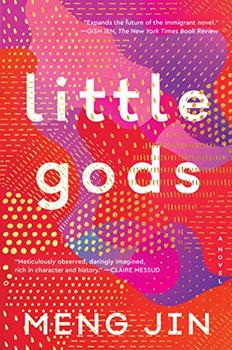Summary | Excerpt | Reading Guide | Reviews | Beyond the Book | Readalikes | Genres & Themes | Author Bio

When the injured come, the nurse is bathing an infant girl. It is past midnight and her shift has ended. Instead of standing in the nursery wiping dried amniotic fluid from this newborn's red skin, she should be at home, facing the wall and trying to sleep.
No replacements have arrived. She does not mind. Walking through the corridors, passing under open windows, she has heard muffled commotion straining the walls. She is not eager to push home through all that. She dips a cloth in warm water, washes and dries the infant, checks the tag on the foot. On the tag she reads 苏兰: Su Lan, a familiar name. Before she can place it, a yellow-green flash lights the window. Then a human noise hurtles into her ears, and in her eyes it is the woman from the morning, mouth in the shape of a scream.
The nurse stands still, holding Su Lan's daughter in both hands.
The daughter begins to cry.
The door opens: her colleague with another child.
In the moment before the door swings shut, shouting in the hallway outside.
God, her colleague says. His mother was just pushing him out when they—right into the delivery room.
They?
I've got to go, her colleague says, and hands the newborn to the nurse, who quickly wraps the new arrival and sets him under the lamp.
All around the nurse the newborns are crying, red faces pinched against white cloth, wet lips open wide. All but Su Lan's girl, who has suddenly grown silent as herself. She picks up the child. She knows it cannot see her. The newborn brain understands shapes and light but cannot process images farther than two lengths of hand away. Still she watches the child watch her, wondering what it dares her to do.
Bodies are lining up in the halls. They come on cardboard stretched between two bicycles, on the flat beds of watermelon carts, in the arms of shouting strangers. A man in blue pants with a wound in his gut lies coiled on an unhinged door, hand curled around the knob. Mattresses are improvised, IVs inserted with bare hands. Nurses triage while wrapping wounds; an off-shift doctor runs through the gate. Trails of blood dry on the floor. In the morgue, volunteers step between bamboo mats, preparing a list of names.
The delivery unit's operating rooms have been taken over by urgent care. Scalpels that earlier extracted babies now extract bullets. Ten of ten beds in the predelivery suite are occupied, along with the floor space between them, by the wounded waiting. New and expecting mothers are moved into two rooms on the top floor. Their families trail behind, looking at their feet. The mothers are silent as they're wheeled through the halls. Some pretend not to see. Some close their eyes and pray.
Su Lan sits up with her eyes red and open, staring coldly into the faces of the wounded.
The nurse stands in the center of the nursery, not knowing what to do. She has stood here for hours, checking vitals, preparing birth certificates, listening to waves of clamor erupt beyond the walls and ceilings and floors. Two more newborns have been brought in, the first by an overnight nurse from the inpatient building, who tells of the maternity ward move, the second by a teenage girl who calls herself a volunteer. The nursery is running out of space. By now, over half the babies should be back with their families. But no one has come to stay and the nurse cannot leave any newborns unattended.
She checks temperatures and heart rates again. There have been no major complications all night, no early babies the size of her palm, no blue-skinned babies whose lungs need coaxing to breathe. Death, she thinks, is elsewhere occupied. She digs in the closet for the largest supply cart with high sides she can find. Syringes and boxes of gauze clatter to the floor. She pulls out the cart and presses her hands and arms on the metal trays to warm them. She pads the top and bottom layers with linens. In this way she squeezes all but one newborn onto the cart. She straps Su Lan's daughter to her chest. The girl starts crying as she pushes the cart out the door.
Excerpted from Little Gods by Meng Jin. Copyright © 2020 by Meng Jin. Excerpted by permission of Custom House. All rights reserved. No part of this excerpt may be reproduced or reprinted without permission in writing from the publisher.
Your guide toexceptional books
BookBrowse seeks out and recommends the best in contemporary fiction and nonfiction—books that not only engage and entertain but also deepen our understanding of ourselves and the world around us.